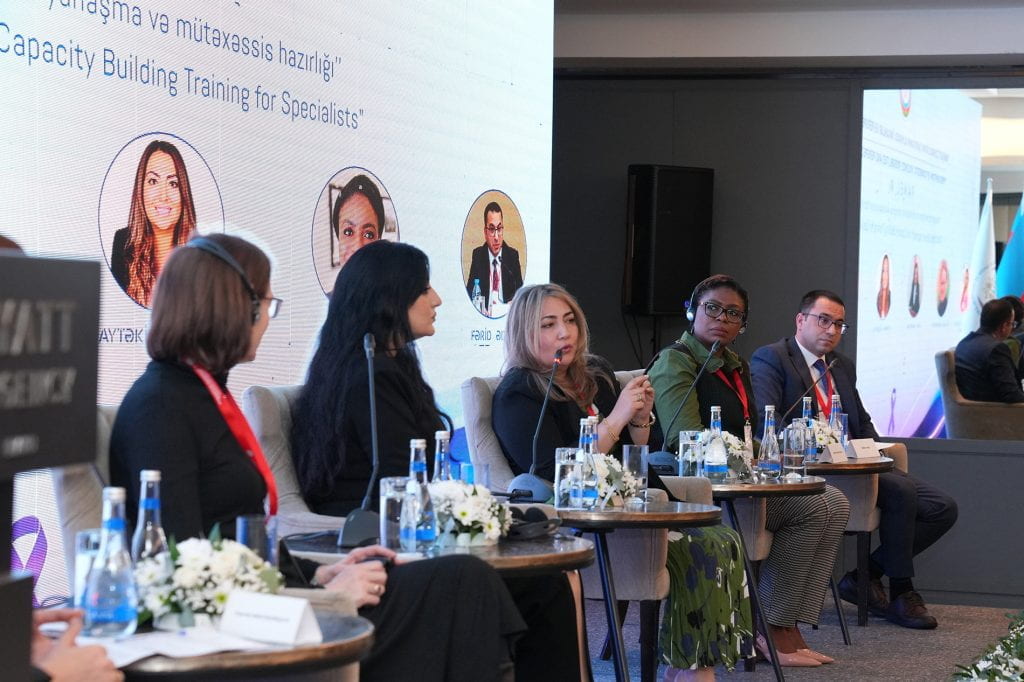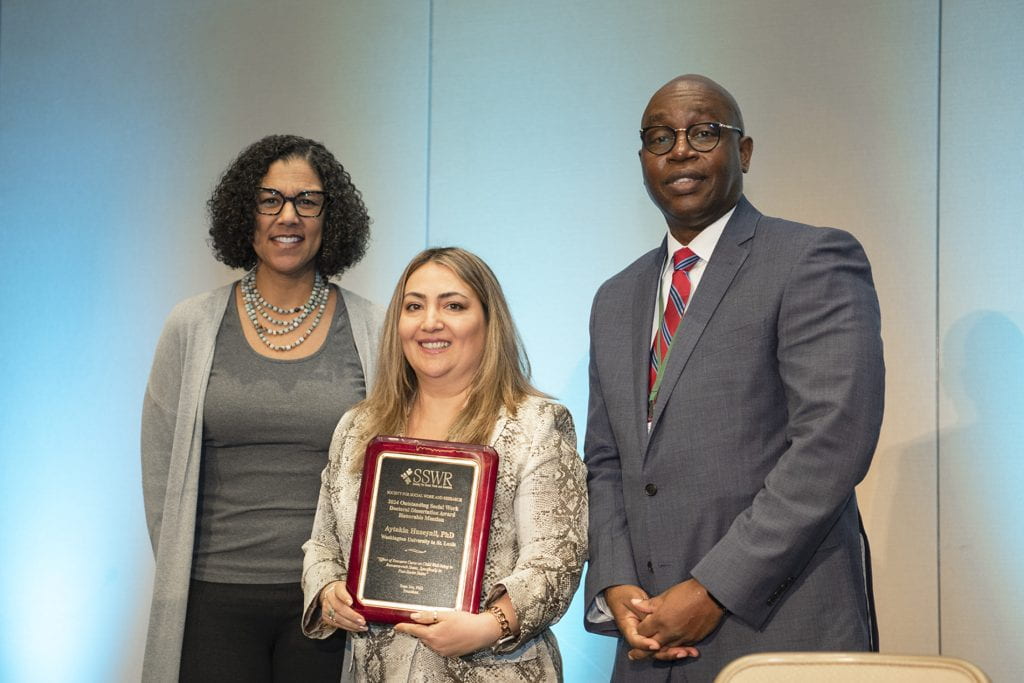
Aytakin Huseynli, postdoctoral fellow in the Center for Social Development (CSD), has received the 2024 Outstanding Social Work Doctoral Dissertation Honorable Mention Award from the Society for Social Work and Research (SSWR).
Society President Sean Joe, a CSD faculty director, and Awards Committee Chair Gina Miranda Samuels presented the award to her on January 13, 2024, at a ceremony held in Washington, DC, during the Society’s annual conference.
“It is an honor to receive this award from the Society for Social Work and Research,” Huseynli said. “I want to thank my dissertation committee members, team members at the Center for Social Development, friends, and family for their continuous support during my doctoral studies and fieldwork. I especially thank my dissertation committee adviser, Professor Sherraden, for his faith in this crazy dissertation idea and trust in my abilities to carry out fieldwork in six countries.”
Huseynli is an expert on social and economic development. Her research explores child well-being, social policy, global social work, and sustainable development, with much of the work centering in post-Soviet nations and countries with natural-resource wealth.
Through the award, SSWR recognizes dissertations exemplifying high standards in social work research and scholarship. The award is intended to encourage the design and conduct of quality research by doctoral-level social workers. Beyond recognition, this award provides an opportunity for authors to present their findings at a professional conference.
The Society evaluates dissertations on their degree of innovation, rigor, creativity, and insight, as well as on their scope and importance to the field. Authors are also evaluated on the effectiveness of their writing and their analyses of oppression, privilege, or marginalization based on identity within the subject area.
The award honors Huseynli’s work on “Effect of Resource Curse on Child Well-Being in Resource-Rich States, Specifically in Post-Soviet States,” which she successfully defended in 2022.
The dissertation examined how Child Development Account (CDA) policy might improve child well-being in low- and middle-income (LMI) post-Soviet nations with natural resource wealth. CDAs are savings or investment accounts opened as early as the beneficiary’s birth with a substantial seed deposit, and many CDA policies offer matching-fund incentives.
Originally proposed by Michael Sherraden, these asset-building accounts are designed to build a financial foundation for investments in higher education and other priorities. CDAs have been extensively tested in CSD’s SEED for Oklahoma Kids experiment.
Huseynli’s work responds to a gap in research on the use of natural-resource wealth to develop human capital through asset-building policies. Her dissertation consisted of three papers that studied child well-being in LMI nations with natural resource wealth, six post-Soviet countries, and developing policy to break the so-called resource curse, a term referring to regressive development in nations with wealth from the exploitation of natural resources.
Because LMI countries make up about 25% of the nations around the world, addressing inadequate child well-being in these countries is a pressing issue.

Results from Huseynli’s research showed that factors typically associated with the resource curse, including oil reserves, poverty of people, and the presence of democracy, were statistically significantly correlated with child well-being. Her findings also suggested that, when decision-makers of resource-rich LMI countries invest in civil society and political activism, child well-being reforms might be more successful.
“Compared to the national oil reserve fund model, CDAs have a direct impact in building assets for children and households in resource-rich LMI countries,” Huseynli wrote in the dissertation’s abstract. Such investment, she noted, “can in turn lead to social and economic development.”
Few dissertations change dynamics in the ways that Huseynli’s has. The dissertation is already shaping policy in Eurasia.
“One of the countries where I did fieldwork has adopted a policy I suggested in the dissertation,” Huseynli said, alluding to the January 1 launch of the National Fund for Children CDA in Kazakhstan. Policymakers in Azerbaijan are also developing a national CDA proposal, and legislators elsewhere have expressed interest.
“I hope other resource-rich LMI countries will follow Kazakhstan’s lead. If it happens, then the well-being of over 100 million children will be positively impacted,” Huseynli added.
A native of Azerbaijan, Huseynli completed her master’s in social work at the Brown School in 2004 and her doctorate in 2023. CSD Director Michael Sherraden chaired her dissertation committee, which included Bret Gustafson, Faculty Director Trish Kohl, Shanta Pandey, and Joe Steensma.
The award from SSWR signals Huseynli’s rising importance as a scholar of asset-building policy and economic development. It also highlights the global movement to embrace CDA policy as a strategy for improving child well-being.
Read more about the contributions of CSD affiliates to SSWR’s 2024 annual conference.
